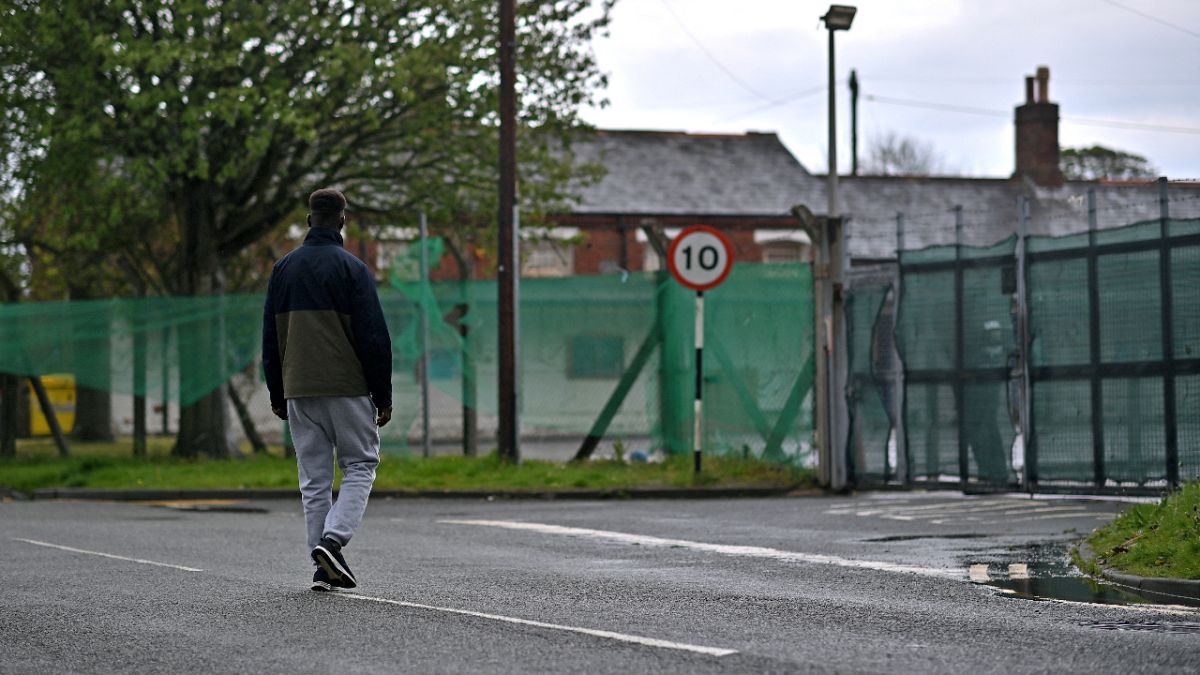A British court has ruled that the Home Office's decision to house asylum seekers and migrants in "squalid" barracks in Folkestone, Kent, was unlawful.
The British government's decision to house asylum seekers and migrants in "squalid" and "unsafe" former military barracks in Folkestone, Kent, was unlawful, a court has ruled.
On Thursday, the High Court ruled in favour of six asylum seekers who claimed that Britain's Home Office had violated their human rights by housing them in "unsafe" conditions at the Napier barracks, prompting a major coronavirus outbreak that saw nearly 200 people infected with COVID-19 at the start of the year.
Justice Linden weighed the details of the outbreak, which unfolded months after the Home Office had been warned by public health officials that housing migrants and asylum seekers in dormitories during the coronavirus pandemic would not be safe, according to Matthew Gold & Co, a firm representing two of the asylum seekers in the case.
He also considered the details of a fire that broke out at the site in January amid protests over the conditions at the Napier barracks, where asylum seekers and migrants are still being held.
Linden found that Home Secretary Priti Patel had unreasonably disregarded Public Health England advice that the barracks were not suitable for housing, while also finding that her department had failed to implement adequate measures to try to protect residents from the risk of COVID-19.
He also found that the claimants in the case had been falsely imprisoned in breach of Article 5 of the European Convention on Human Rights when Napier barracks was placed under a lockdown following the coronavirus outbreak, which began in January.
His ruling could lead the way for future cases from other men who have been held at the camp to seek justice.
'Finally heard'
In a statement shared with Euronews, Clare Jennings, the director and head of public law at Matthew Gold & Co, said she was "delighted that the High Court has recognised that the Home Secretary’s decision to accommodate men in Napier barracks was unlawful and irrational and that residents were unlawfully deprived of their liberty".
"The Claimants and the other Napier residents endured months of living cheek-to-jowl with hundreds of other men in overcrowded dormitories, without any privacy, at risk of injury from fire and COVID-19, which has seriously affected their mental and physical health," Jennings said.
"For months the Home Secretary ignored the complaints and concerns of residents, charities and legal representatives that Napier barracks was unsuitable to house destitute asylum seekers, that vulnerable men were wrongly being sent to the barracks, and that the continued use of Napier was endangering the physical mental health of residents," she continued.
"Today, these residents of Napier barracks were finally heard. This judgment confirms that Napier barracks did not provide adequate accommodation for the asylum seekers housed there and should never have been used," she said.
'Urgent action is now required'
While Jennings welcomed Thursday's decision, however, she said that "urgent action is now required from the Home Secretary, in light of this damning judgment, to move those men still at Napier to suitable accommodation and to immediately stop the use of the barracks for housing asylum seeking men”.
In a separate statement shared with Euronews, Mariam Kemple Hardy, Head of Campaigns at refugee advocacy group Refugee Action, joined in calls to shut Napier barracks "and all other camp-style accommodation" down.
“This judgement vindicates all those who repeatedly told the Government that recklessly forcing hundreds of refugees into crowded camps during a killer pandemic was a gamble with people’s lives," Kemple Hardy said.
“It’s high time Ministers found some compassion in how they treat people seeking asylum, many of whom have fled violence, persecution and torture," she said. “Napier barracks and all other camp-style accommodation must be shut down. Refugees should be housed in our communities, close to the cultural, health and legal support they desperately need.”
In a separate statement, Jon Featonby, Refugee and Asylum Policy Manager at British Red Cross, said "military barracks are unsuitable places for people who have been through such traumas".
"We believe that people who have experienced some of the worst horrors imaginable – fleeing war, persecution and violence – should be able to expect a safe, clean place of refuge when they arrive in the UK which is suitable for their needs, including their physical and mental health," he said.
Home Office defends decision
In a statement sent to Euronews, a Home Office spokesperson defended the decision to house asylum seekers at the barracks and said asylum seekers would continue to be housed at the facility.
“During the height of the pandemic, to ensure asylum seekers were not left destitute, additional accommodation was required at extremely short notice," they said. “Such accommodation provided asylum seekers a safe and secure place to stay. Throughout this period our accommodation providers and sub-contractors have made improvements to the site and continue to do so."
The spokesperson said it was "disappointing" that the judgment appeared to be based on the site prior to "significant improvement works" which they said have taken place "in difficult circumstances".
However, they said: "Napier will continue to operate and provide safe and secure accommodation."
“We will carefully consider the ruling and our next steps," they said.
Featonby suggested that the Home Office reconsider its approach, saying: "We have a once-in-a-generation opportunity to create a fair, compassionate and efficient asylum system through reform."
" As part of those reforms, the Government must work with local authorities, devolved governments and charities, to increase community housing for people seeking refuge here. That should start with the immediate ending of the use of military barracks to house people," he said.


